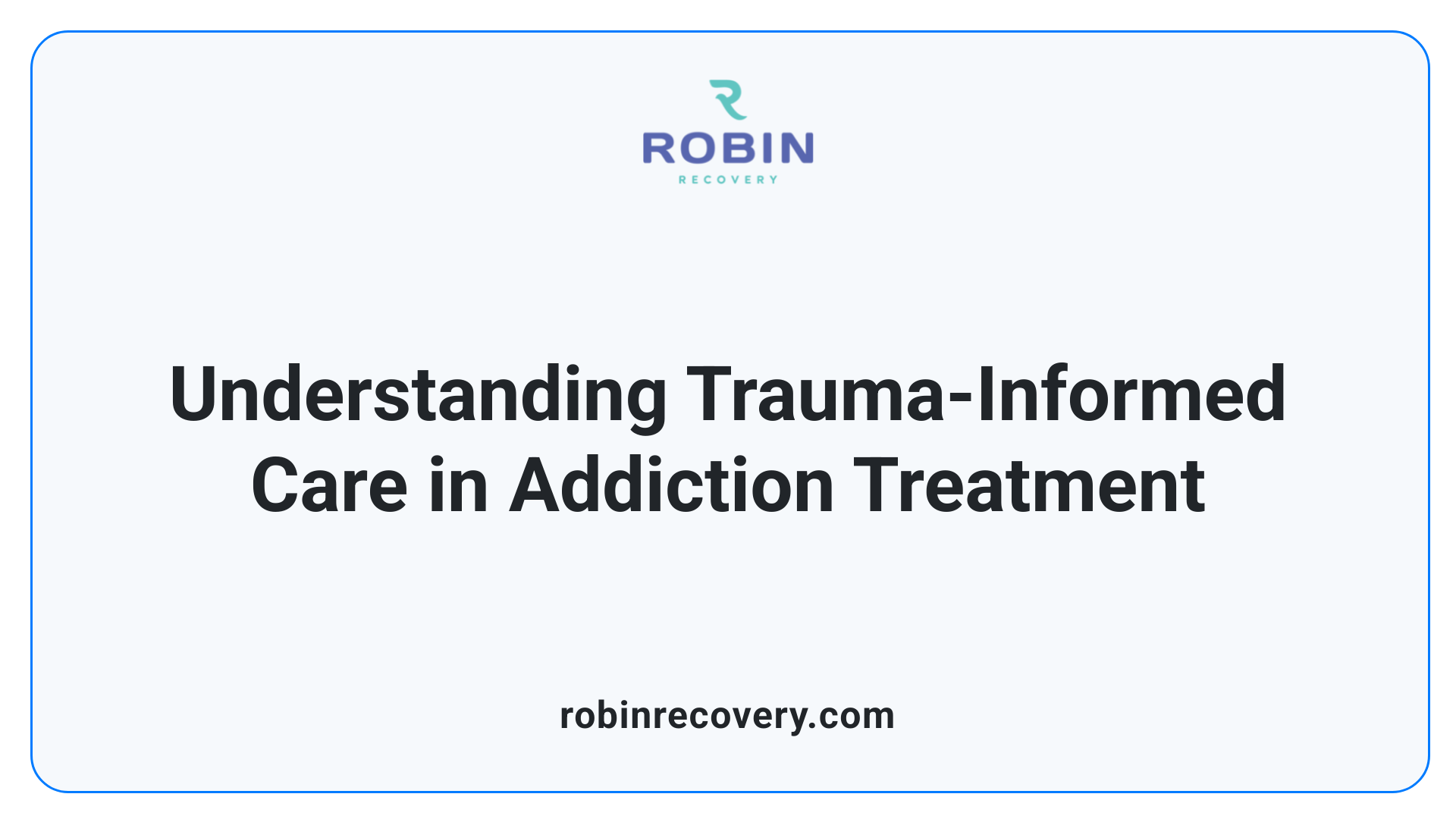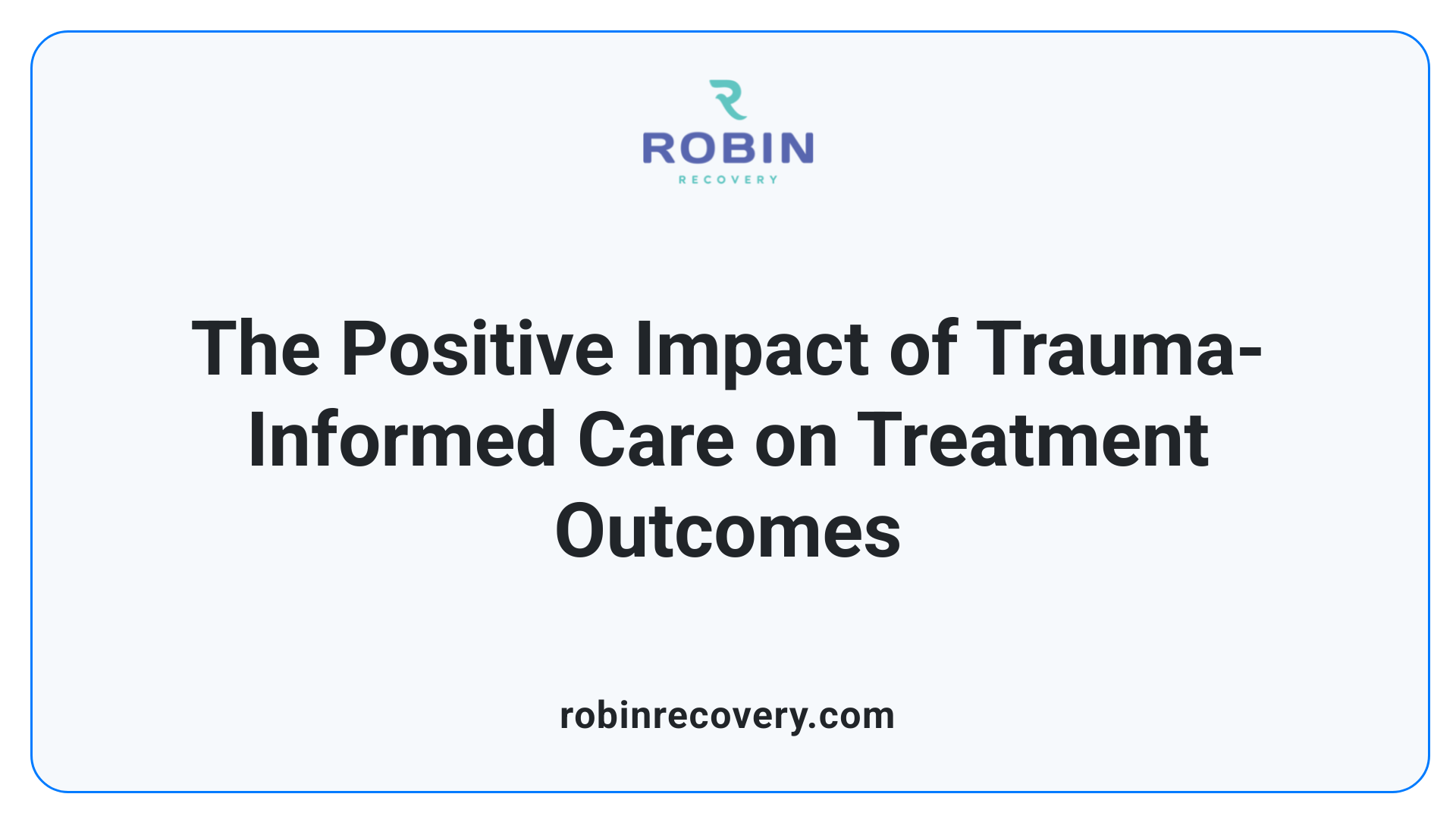The impact of trauma-informed care on addiction treatment outcomes

Understanding the Role of Trauma in Addiction
Addiction treatment often grapples with the complexities of trauma, a substantial contributor to substance use disorders. Trauma-informed care (TIC) provides a compelling framework for understanding and addressing these intricacies, emphasizing the vital connection between trauma histories and addiction treatment outcomes. This approach acknowledges that trauma can significantly impact an individual's ability to engage in recovery, often leading them to use substances to cope with unresolved trauma. Through trauma-informed care, treatment providers can create supportive environments that promote healing and improve the effectiveness of addiction treatments.
Defining Trauma-Informed Care in Addiction Treatment

What is trauma-informed care in addiction treatment?
Trauma-informed care in addiction treatment recognizes the profound effects of trauma on an individual's journey to recovery. It emphasizes creating a secure and nurturing atmosphere that fosters trust and empowers clients throughout their healing process. This approach acknowledges the physiological and psychological repercussions of trauma, especially among those with addiction histories who have often encountered adverse life events.
By implementing trauma-sensitive strategies, practitioners can facilitate a more engaging and controlled experience for their clients. This allows individuals to feel more understood and supported, which can significantly enhance their treatment experience.
Significance of a supportive environment
Establishing a supportive environment is crucial in trauma-informed care. This environment not only prioritizes physical safety but also promotes emotional well-being by allowing individuals to express their needs without fear of judgment or re-traumatization. Ultimately, trauma-informed care aims to incorporate a thorough understanding of trauma across all treatment processes, thereby fostering improved recovery outcomes.
How Trauma-Informed Care Enhances Treatment Outcomes

How does trauma-informed care improve outcomes?
Trauma-informed care (TIC) significantly enhances treatment outcomes for individuals grappling with substance use disorders (SUDs) by addressing the deep-seated effects of trauma. According to studies, the Adverse Childhood Experiences (ACE) report highlights a strong correlation between trauma and SUDs, demonstrating that individuals with higher ACE scores are at greater risk for developing addiction.
TIC focuses on creating a safe and supportive environment, prioritizing elements such as safety, collaboration, and trustworthiness. This fosters better communication between clients and providers, helping patients feel understood, heard, and empowered. Key principles of TIC facilitate a culture that values patient engagement, which is crucial for adherence to treatment plans.
Impact on treatment retention and relapse rates
Research indicates that implementing TIC is associated with improved treatment retention and reduced relapse rates. Individuals receiving trauma-informed services are less likely to dropout of treatment, as they engage more effectively when their trauma histories are acknowledged.
Furthermore, the integration of trauma therapy with addiction treatment allows healthcare providers to address underlying issues that may lead to substance use. Studies show that as PTSD symptoms decrease, individuals are better equipped to manage their substance use, thus promoting long-term recovery.
In summary, the strengths-based approach of TIC improves mental health outcomes and reduces the stigma surrounding addiction by empowering individuals to navigate their recovery journey with greater agency and support.
The Profound Impact of Trauma-Informed Practice

What is the impact of trauma-informed practice?
The impact of trauma-informed practice is profound, as it acknowledges the widespread prevalence of trauma, with over 70% of the population experiencing traumatic events. By creating safe and supportive environments, this practice helps mitigate the risk of retraumatization, particularly for individuals from marginalized populations who are often disproportionately affected by trauma's effects.
This practice emphasizes the importance of understanding individuals' experiences and tailoring services to meet their complex needs in a way that fosters safety, trust, and empowerment. Adopting trauma-informed practices can lead to significant improvements in mental health outcomes, addressing issues such as anxiety, depression, and PTSD.
Effects on mental health and patient engagement
Trauma-informed care fundamentally reshapes how treatment is delivered, focusing on the individual rather than solely on symptoms. By integrating an understanding of trauma into treatment, providers can develop more effective interventions that resonate with clients, ultimately enhancing engagement in care.
Studies indicate that when clients feel understood and supported, they are more likely to remain in treatment and adhere to therapeutic plans. This connection improves overall outcomes, making it crucial to implement trauma-informed principles throughout addiction treatment settings.
Role in reducing stigma and misunderstanding
Trauma-informed practice also plays a vital role in reducing stigma around mental health and substance use disorders. By fostering an environment of understanding and respect, clients are more likely to share their experiences without fear of judgment. This shift in perception not only helps in building a trusting therapeutic relationship but also promotes a culture where individuals feel empowered to confront their trauma and its consequences.
In conclusion, advocating for trauma-informed approaches in treatment is essential for creating accessible mental health services and improving outcomes for those affected by trauma.
Outcomes Achieved Through Trauma Therapy

What are the outcomes of trauma therapy?
The outcomes of trauma therapy extend well beyond mere symptom management. Primarily, it aids in emotional healing, helping individuals process and integrate their traumatic experiences into healthier narratives. As individuals engage in this structured therapy, they develop coping strategies that allow them to confront and manage the emotional triggers associated with trauma.
This therapy is built on the principle of restoring a sense of safety in the individual’s life. By addressing issues related to trauma, individuals can work through underlying imbalances in their nervous systems, leading to a substantial reduction in anxiety and hyperarousal. This process is integral in fostering resilience, enabling clients to bounce back from challenges that arise in recovery.
Moreover, trauma therapy fosters a clearer sense of self, assisting individuals in separating their identities from the trauma they have endured. This holistic approach ultimately leads to improved mental health, equipping individuals with the tools they need to navigate future challenges and significantly enhancing their overall well-being.
Evidence-Based Practices in Trauma-Informed Care

What are the evidence-based practices in trauma-informed care?
Evidence-based practices in trauma-informed care (TIC) hinge upon six core principles identified by the Substance Abuse and Mental Health Services Administration (SAMHSA):
- Safety: Creating a physically and emotionally safe environment for patients.
- Trustworthiness and Transparency: Ensuring clear communication and openness in treatment processes.
- Peer Support: Incorporating support from individuals with shared experiences to facilitate healing.
- Collaboration and Mutuality: Building partnerships between patients and providers to foster a sense of shared purpose.
- Empowerment, Voice, and Choice: Inclusive decision-making that respects patient autonomy.
- Cultural, Historical, and Gender Issues: Being sensitive to the diverse backgrounds and experiences of patients.
These practices aim to mitigate the risk of re-traumatization and promote empowerment in patients through their involvement in treatment planning. Screening for trauma is an essential component, guiding tailored interventions that address individual needs.
Importance of training and tailored interventions
Effective implementation of TIC necessitates comprehensive training for all staff members, enabling them to recognize and respond to trauma symptoms effectively. Conducting training sessions helps instill understanding of trauma's impact on health behaviors, promoting a cooperative healthcare culture.
Tailored interventions resulting from trauma screenings are critical in enhancing patient engagement and adherence to treatment. By personalizing care based on trauma histories, providers can create supportive environments that significantly improve overall health outcomes. This approach not only fosters healing but also reduces dropout rates in treatment.
Core Principles of Trauma-Informed Care
What are the principles of trauma-informed care?
Trauma-informed care (TIC) is built on several foundational principles designed to create a supportive environment for individuals who have faced trauma. These principles include:
- Safety: Ensuring that clients feel both physically and emotionally secure during treatment sessions.
- Trustworthiness and Transparency: Building reliable relationships where clients can confidently share their experiences without fear of judgment.
- Peer Support: Encouraging connections among clients to foster a sense of community and shared understanding.
- Collaboration and Mutuality: Promoting a partnership approach where clients and providers work together in treatment planning and decision-making.
- Empowerment: Helping clients regain control over their lives, guiding them to recognize their personal strengths and resilience.
- Voice and Choice: Allowing clients the autonomy to make choices in their treatment process, acknowledging their preferences and needs.
- Cultural, Historical, and Gender Issues: Recognizing and respecting clients’ unique backgrounds and experiences which may influence their healing journey.
Application in clinical settings
In clinical settings, these principles significantly shape the treatment process. By ensuring client safety and fostering a trusting environment, providers can encourage open dialogue about trauma-related issues.
This approach not only improves patient engagement but also enhances overall treatment outcomes. Moreover, by training staff to integrate TIC principles, treatment centers can create holistic care plans that address both substance use and underlying trauma, ultimately promoting lasting recovery. This comprehensive understanding aids in developing tailored interventions that consider the complex interactions between trauma histories and substance use disorders.
Implementing Trauma-Informed Care in Addiction Treatment Settings
What are the challenges and strategies in implementing trauma-informed care?
Implementing trauma-informed care (TIC) in addiction treatment settings presents challenges such as staff training and reassessing treatment approaches. Educating all personnel, including non-clinical staff, about TIC principles is essential. This training enhances their ability to understand trauma’s effects and provides comprehensive support for patients.
To overcome these challenges, organizations can adopt strategies like routine screening for trauma and PTSD symptoms during intake assessments. Integrating feedback mechanisms can also help adjust treatment plans based on individual needs, ensuring a responsive care environment that respects clients' histories and promotes healing.
What are some real-world applications and success stories?
Numerous treatment centers, such as Swift River, have successfully integrated TIC into their services. They employ comprehensive assessments and individualized treatment plans, significantly strengthening engagement and retention rates.
Additionally, programs using the Seeking Safety model, which emphasizes trauma-informed principles, have reported reductions in PTSD symptoms among participants. Such real-world applications demonstrate the efficacy of TIC in fostering patient trust, facilitating open communication, and improving overall treatment outcomes.
The Future of Addiction Treatment through Trauma-Informed Approaches
As the understanding of trauma's role in addiction deepens, trauma-informed care is poised to become a cornerstone of effective addiction treatment. By addressing the underlying trauma that often fuels substance use disorders, TIC not only enhances immediate treatment outcomes but also supports long-term recovery by building resilience and fostering healthier coping mechanisms. As evidenced by empirical research and on-the-ground successes, integrating trauma-informed principles into addiction treatment not only improves patient engagement and reduces relapse rates but also transforms the way healthcare providers approach addiction as a whole. By continuing to implement and refine trauma-informed practices, the addiction treatment field can expect to see a future where compassionate, informed care leads to significantly improved recovery outcomes for all individuals affected by trauma and addiction.
References
- Trauma-Informed Care: A Sociocultural Perspective - NCBI
- The Impact of Trauma-Informed Care in Addiction Treatment
- The Impact of Trauma-Informed Care on Addiction Treatment ...
- Study protocol: implementing and evaluating a trauma-informed ...
- Trauma-Informed Approach Enhances Substance Use Disorder ...
- [PDF] Practical Guide for Implementing a Trauma-Informed Approach
- Integrating a Trauma-Informed Approach into Substance Use ...
- Understanding Trauma-Informed Care for Positive Outcomes in ...
- The Link Between Trauma and Addiction - Spero Health
